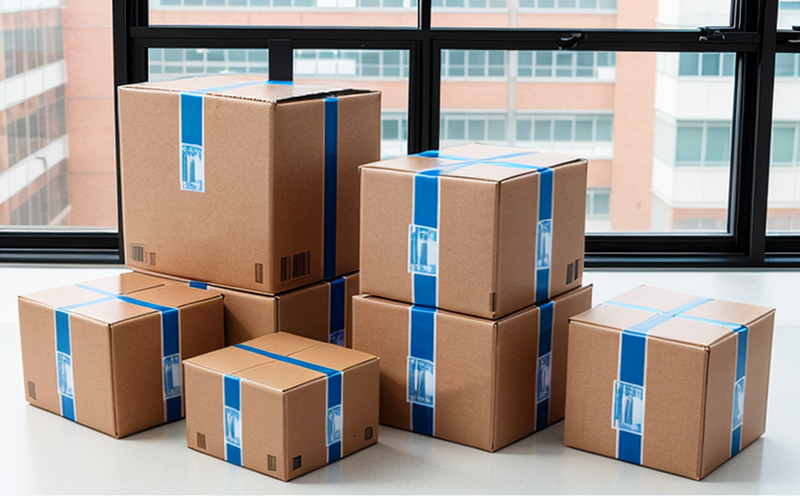DIN 53380 Gas Permeability of Packaging Films Containing Nanomaterials
The DIN 53380 standard is a critical tool for quality managers, compliance officers, R&D engineers, and procurement teams working with packaging films that incorporate nanomaterials. This test evaluates the gas permeability characteristics of these materials under controlled conditions.
Gas permeability testing assesses how effectively different gases can pass through a packaging film material. In the context of nanomaterials, this is particularly important as nanoscale additives can profoundly influence barrier properties and overall performance. DIN 53380 specifies a method to measure gas diffusion coefficients in films with nanoscopic structures, which is essential for ensuring product integrity and shelf life.
The test setup involves placing the packaging film between two chambers of defined volume, separated by a membrane made from the material being tested. One chamber contains a gas at a specified pressure and temperature while the other is evacuated or filled with another gas under different conditions. Over time, the gas migrates across the membrane into the second chamber. The rate of this migration is measured, allowing for the calculation of the permeability coefficient.
The DIN 53380 method ensures accurate results by accounting for various factors that can affect permeation rates, including temperature, humidity, and film thickness. Understanding these parameters is crucial for optimizing packaging design to meet specific performance requirements such as maintaining freshness, preventing contamination, or ensuring safety during storage and transport.
For nanomaterials, the unique properties at the nanoscale level make gas permeability testing especially important. Nanoparticles can enhance barrier properties by creating a more compact layer within the film matrix, thus reducing the path available for gas molecules to travel through. This can lead to significant improvements in oxygen and moisture barriers, which are vital for preserving food quality or protecting pharmaceuticals.
Testing according to DIN 53380 helps manufacturers ensure compliance with international regulations on packaging materials, particularly when dealing with products that need extended shelf life or have specific environmental concerns. It also aids in the development of new nanomaterial-based packaging solutions by providing precise data on how these additives impact gas barrier performance.
Accurate testing is essential for maintaining product quality and safety across various industries. By adhering to standards like DIN 53380, companies can demonstrate their commitment to high-quality production processes and meet consumer expectations regarding freshness retention and environmental friendliness.
Why It Matters
The importance of gas permeability testing in nanomaterial-containing packaging cannot be overstated. Properly designed films are key to extending shelf life, maintaining product quality, and ensuring safety during transportation and storage.
In the food industry, for example, extended shelf life is crucial for minimizing waste and reducing costs associated with spoilage. By using films that effectively block oxygen and moisture, manufacturers can extend the freshness period of perishable items like fruits, vegetables, or baked goods. This not only enhances consumer satisfaction but also contributes positively to sustainability goals.
For pharmaceuticals, preserving active ingredients is paramount for efficacy. Packaging with superior barrier properties helps maintain drug stability over longer periods, ensuring that treatments remain effective even when stored in challenging environments such as hot climates or extended shipping durations.
In the electronics sector, protecting sensitive components from atmospheric contaminants like moisture and oxygen is vital to preventing degradation of performance and reliability. Nanomaterials can play a significant role here by enhancing these protective qualities further than traditional materials alone could achieve.
From an environmental perspective, reducing packaging waste while simultaneously extending product life cycles aligns with broader sustainability initiatives. The ability to design smarter packages that perform better without increasing material usage supports greener practices throughout supply chains.
Overall, DIN 53380 gas permeability tests provide valuable insights into the performance characteristics of nanomaterial-containing films. They enable informed decisions about material selection and processing conditions aimed at optimizing both functionality and sustainability aspects of packaging solutions across multiple sectors.
Applied Standards
| Standard Number | Description | Purpose |
|---|---|---|
| DIN 53380 | Gas Permeability of Packaging Films Containing Nanomaterials | To determine the permeability coefficients for gases through packaging films with nanoscopic structures. |
| ISO 15106 | Packaging—Determination of gas transmission properties of materials and multi-layer systems | To establish a common methodology for measuring gas transmission rates through packaging materials. |
| ASTM D3985 | Determination of Permeability to Gases Using the Cup And Sack Method | A similar standard focusing on cup and sack testing methods for determining permeability in packaging films. |
Eurolab Advantages
At Eurolab, our expertise in nanomaterials testing ensures that we provide accurate and reliable results according to DIN 53380. Our state-of-the-art facilities equipped with advanced instrumentation allow us to conduct precise gas permeability tests on complex materials like those containing nanoparticles.
We understand the unique challenges associated with testing such materials and have developed robust protocols tailored specifically for nanomaterials. This includes thorough specimen preparation techniques that account for potential effects at the nanoscale level, ensuring consistent results across all samples tested.
Our experienced team of scientists brings deep knowledge in both nanotechnology and packaging science to every project they undertake. They work closely with clients from various industries to ensure their specific needs are met during testing processes. Whether you're looking to comply with regulatory requirements or simply improve your product's performance, Eurolab offers comprehensive support throughout the entire process.
In addition to our technical capabilities, we pride ourselves on delivering timely reports that include detailed analyses and recommendations based on the findings from each test conducted. This ensures that clients have all necessary information at their disposal when making important decisions about their packaging strategies.





